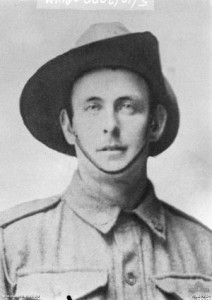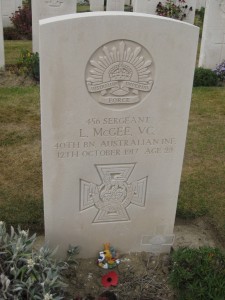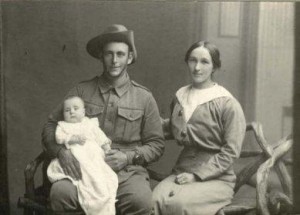
Sergeant Lewis McGee VC
40th Battalion Australian Imperial Force
(Wiki image)
Battle of Broodseinde. Passchendaele Offensive. Action of 4 October 1917
No inscription on marker
For most conspicuous bravery when in the advance to the final objective, Sjt. McGee led his platoon with great dash and bravery, though strongly opposed, and under heavy shell fire.
His platoon was suffering severely and the advance of the Company was stopped by machine gun fire from a “Pill-box” post. Single-handed Sjt. McGee rushed the post armed only with a revolver. He shot some of the crew and captured the rest, and thus enabled the advance to proceed. He reorganised the remnants of his platoon and was foremost in the remainder of the advance, and during consolidation of the position he did splendid work.
This Non-commissioned Officer’s coolness and bravery were conspicuous and contributed largely to the success of the Company’s operations.
Sjt. McGee was subsequently killed in action [12 October 1917].
Tyne Cot Cemetery and Memorial is located outside of Passchendaele and is the largest Commonwealth military cemetery of all time with 11,965 burials. Many are unknown. Within its walls is the German Army Tyne Cot blockhouse captured by Australian Forces on 4 October 1917 and two German fortifications known as Irksome and The Barnacle. Tyne Cot has dedicated considerable effort towards the visitor’s experience modernizing its exterior layout to accommodate tour buses away from the original lane vantage and entry point. As one walks towards the entry speakers read out names of the fallen which carry through to the Interpretive Centre with several Great War items on exhibit as well as the historic Great War archaeological finds made as the site was prepared. Sergeant McGee’s marker is, like others, frequently provided with commemorations. This day was to be no different with a ceramic kangaroo and poppy left at his graveside. As I studied for today’s post I saw another image of Sergeant McGee with his wife Eileen and baby daughter Nada taken in 1916. Often I think about these type of images. Soldiers off to war…a family in waiting…will they come home? It is a familiar tragedy for many families and one heartfelt in the Ferguson home knowing of grandmother “Grannie” Hazel who lost her father, Ole Berget of the 31st Canadian Infantry Battalion on 3 May 1917. Grannie, at the time, was two years two months of age…one of many left to remember.

McGee marker at Tyne Cot Cemetery, Belgium, Age 29
(P. Ferguson image, September 2009)
Helpful Link
Australian War Memorial

Lewis McGee with wife Eileen and daughter Nada.
(Wiki Image)
Tags: 12 October 1917, 4 October 1917, 40th Battalion Australian Imperial Force, Broodseinde (Passchendaele), Family, Lewis McGee VC, Posthumous Victoria Cross, Tyne Cot Cemetery
This entry was posted by pferguson
on Tuesday, November 8th, 2022 at 1:04 pm and is filed under November Series, Remember Them Well.
You can follow any responses to this entry through the RSS 2.0 feed.
You can leave a response, or trackback from your own site.
About The Author

Paul has worked with the Paradigm Motion Picture Company since 2009 as producer, historian and research specialist. Paul first met Casey and Ian WIlliams of Paradigm in April 2007 at Ieper (Ypres), Belgium when ceremonies were being held for the re-dedication of the Vimy Memorial, France.
Paul's sensitivity to film was developed at an early age seeing his first films at RCAF Zweibrucken, Germany and Sardinia. Paul returned to Canada in 1967 and was captivated by David Lean's "Lawrence of Arabia" and "Bridge on the River Kwai". Over time Paul became increasingly interested in storytelling, content development, character, direction, cinematography, narration and soundtracks.
At the University of Victoria, Paul studied and compared Japanese and Australian film and became interested in Australian film maker Peter Weir and his film "Gallipoli" (1981). Paul was inspired when he learned Weir visited the beaches, ridges and ravines of the peninsula. "Gallipoli", the film, led Paul on many journeys to sites of conflict in England, France, Belgium, Holland, Germany, Malta, Hawaii, Gallipoli, North Macedonia and Salonika.
When Paul first watched documentary filmmaker Ken Burns, "The Civil War", Paul understood how his own experience and insight could be effective and perhaps influential in film-making. Combining his knowledge of Museums and Archives, exhibitions and idea strategies with his film interests was a natural progression.
Paul thinks like a film-maker. His passion for history and storytelling brings to Paradigm an eye (and ear) to the keen and sensitive interests of; content development, the understanding of successful and relational use of collections, imagery and voice. Like Paul's favorite actor, Peter O'Toole, Paul believes in the adage “To deepen not broaden.”
While on this path Paul always remembers his grandmother whose father did not return from the Great War and how his loss shaped her life and how her experience continues to guide him.




Comments